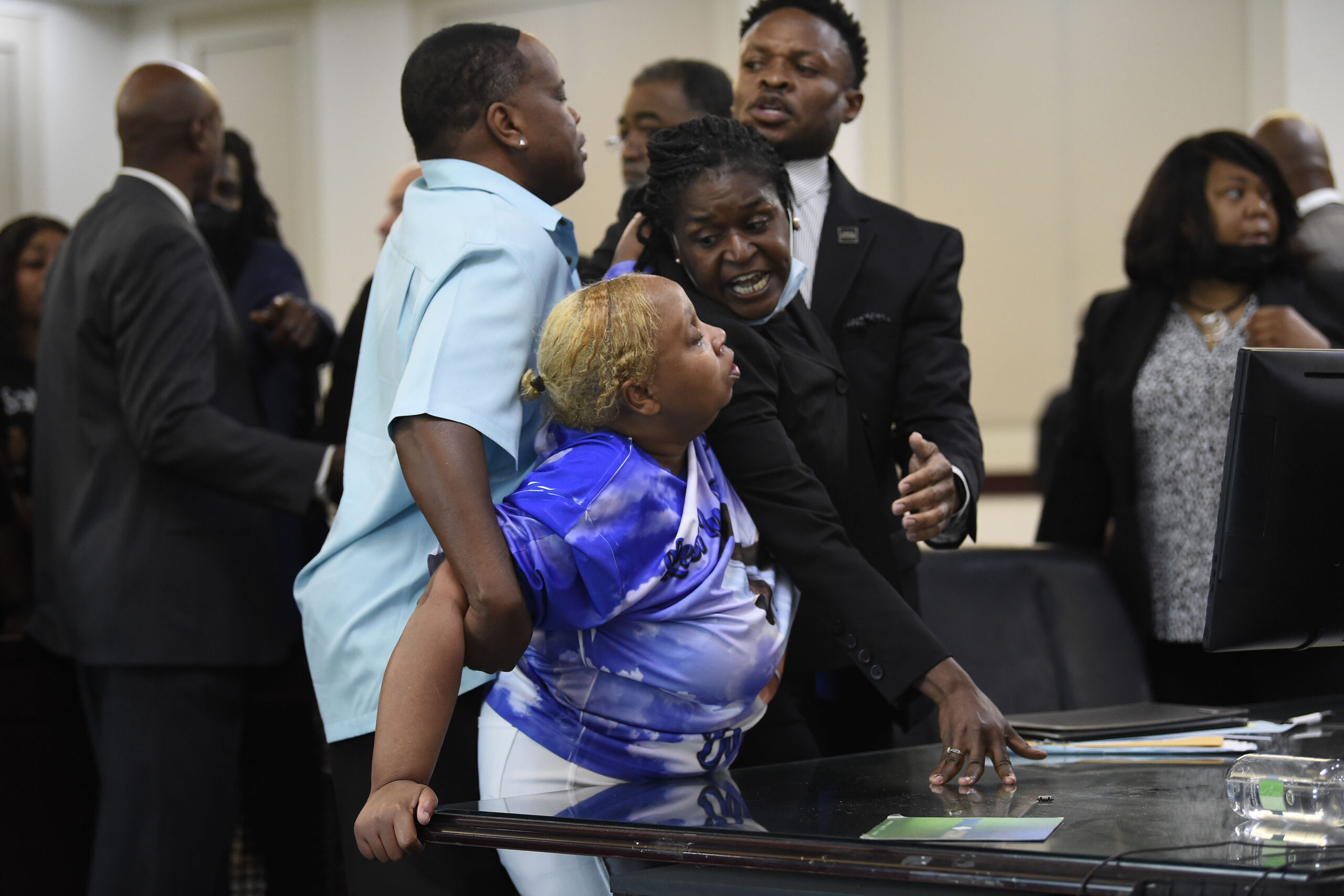NASHVILLE, Tenn. (AP) — The mother of a Black man fatally shot by a white former Nashville officer sobbed, screamed and knocked over a courtroom lectern Friday as she begged a judge not to accept a plea deal she says was struck in secret without her knowledge, a chaotic scene that briefly delayed the hearing before the judge accepted the agreement.
Former officer Andrew Delke pleaded guilty to manslaughter over the death of Daniel Hambrick, 25, in 2018 as part of an agreement with prosecutors.
Delke will serve a three-year prison sentence. As part of the agreement, he won’t pursue parole or appeal the case. However, Delke’s defense team said he will likely serve a year and a half in jail with standard credits.
The hearing turned volatile as Hambrick’s mother, Vickie, gave a lengthy statement as family members and others applauded. Other supporters, outside the courtroom in the hallway, banged on the door in support. Delke’s family sat on the other side of the courtroom with security guards.
“I hate you,” Vickie Hambrick screamed over and over again, while also yelling out profanities, directing some at Delke and prosecutors.
In a particularly chaotic moment, the mother knocked over the lectern and a computer monitor and family members rushed to her side. Delke and Judge Monte Watkins were briefly ushered out of the courtroom.
Delke was about to face trial for a first-degree murder charge, but on Thursday, his attorney announced he had agreed to plead guilty to voluntary manslaughter.
“I hope this case can contribute positively about the much needed discussion about how police officers are trained and how we as a community want police officers to interact with citizens. I am deeply sorry for the harm my actions caused,” Delke said shortly after entering his plea, his voice cracking at times.
A group of roughly two dozen protesters gathered outside the courthouse, chanting “no racist police” to show their opposition to Delke’s plea deal. Others wore shirts noting that police officers and white people receive lighter penalties for committing the same crimes as Black and brown people.
Hambrick’s family said they were not contacted or consulted and did not know about the plea deal until after it was done.
“I have contempt for this system. I have contempt for this plea. I have contempt for the (Fraternal Order of Police). And I have a special contempt for Andrew Delke. May you all rot in hell,” said attorney Joy Kimbrough, who read the statement of Vickie Hambrick as she wept behind her.
District Attorney Glenn Funk told reporters afterward that he informed Hambrick’s family attorney of the deal Wednesday and met with Vickie Hambrick on Thursday. He said has been in contact with them for three years, knew Vickie Hambrick wanted Delke to be convicted of murder and sentenced to prison for life, and he had to decide what was in the best interest for the state.
He said there was a “very large percentage” chance that the case would have ended in a hung jury, which he said would have meant the emotion seen in the courtroom Friday “would have been played out 100-fold.” Funk also called it “significant progress” that “tonight will be the first night Nashville has had a police officer in jail for shooting a Black man on duty.”
“I was not willing to risk not having a felony conviction, not having him off the force, not having him incarcerated, not having him be able to make a guilty plea where he conceded that he did in fact use deadly force that was not reasonably necessary,” Funk said.
Delke, 27, submitted his resignation Thursday. He had been decommissioned, which means he had to turn over his gun but was able to work a desk job and still get paid.
After COVID-19 delays and pretrial back-and-forth, jury selection was slated to start next week . The trial was going to center on a handgun Hambrick was holding that Delke claims was pointed at him for a moment, which prosecutors dispute and video footage does not show.
Prosecutors focused on surveillance footage that captured the shooting, in which Delke stops chasing and shoots the fleeing man. Defense attorneys have contended there was a 36-foot (11-meter) blindspot and plenty could have happened there. There were dozens of cameras, and defense attorneys contended that it was possible that more footage was caught of that blindspot, but wasn’t reviewed by investigators before it was automatically overwritten on the system.
The month after the shooting, Funk released surveillance footage of the shooting publicly, sparking wider attention and outcry. Delke was charged in September 2018, and the shooting caused enough backlash that voters that November installed a community oversight board for Nashville’s police department.
Since 2005, there have been 143 nonfederal sworn law enforcement officers with arrest powers arrested for murder or manslaughter resulting from an on-duty shooting throughout the U.S., with only 45 convicted of a crime resulting from the on-duty shooting, according to a tally by Bowling Green State University criminal justice professor Philip Stinson before Delke’s plea. Another 45 of the cases are still pending, according to the findings.
Delke’s attorneys argued the officer followed his training and Tennessee law in response to “an armed suspect who ignored repeated orders to drop his gun.” Funk argued Delke had other alternatives, adding that the officer could have stopped, sought cover and called for help.
Nashville’s Metro Council has approved a $2.25 million settlement to resolve a lawsuit by Hambrick’s family.
For Vickie Hambrick, who is legally blind, the loss of her only child will forever haunt her.
“My son was my eyes,” Kimbrough said, reading Vickie Hambrick’s statement. “Since he’s been gone, things have not been the same and they never will be.”
![]()
















































